2021年度全国十大考古新发现揭晓! China unveils its top 10 archaeological discoveries of 2021
中国日报网 2022-04-01 10:48

3月31日,2021年度全国十大考古新发现揭晓。
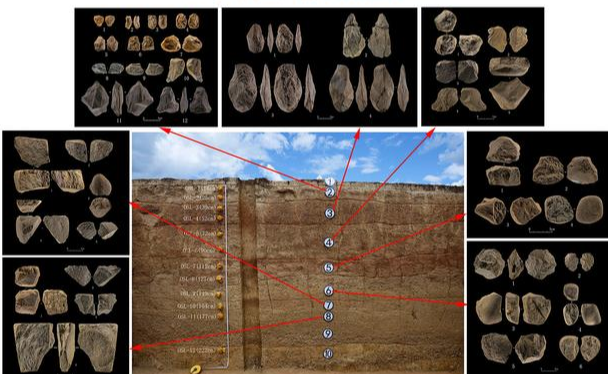
Piluo site, Sichuan Province
四川稻城皮洛遗址
Piluo is by far China's best preserved archaeological site from the Paleolithic period dating back from 2.5 million to around 10,000 years ago. It is situated in the Qinghai-Tibet Plateau in southwest China's Sichuan Province.
皮洛遗址位于四川省,是迄今为止青藏高原考古发现的地层保存最完整的旧石器时代(距今约250万年——1万年)旷野遗址。
Over 6,000 stone artifacts were discovered in September, including Acheulean axes previously found mainly in prehistoric sites across Africa and the western coast of the Eurasian continent.
截至去年9月,已出土6000余件石制品,包括阿舍利手斧。之前发现的这种手斧主要分布在非洲和欧亚大陆西侧的史前遗址内。
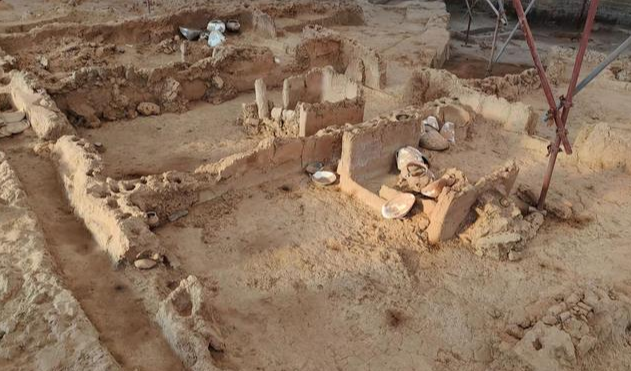
Huangshan site, Henan Province
河南南阳黄山遗址
The ancient site of Huangshan in Nanyang, central China's Henan Province, is known for cultural relics from the Neolithic period. Chinese archaeologists have excavated around 2,400 square meters of the 300,000-square-meter site and discovered cultural relics from the Neolithic period, such as house sites, workshops and tombs of the Yangshao, a Neolithic culture that existed along the Yellow River in China from around 5,000 to 3,000 BC.
黄山遗址位于河南省南阳市,是一处总面积30万平方的新石器时代遗址。目前,发掘面积共2400平方米,出土了大量的重要文化遗存,其中包括仰韶文化房址、作坊、墓葬等。仰韶文化,是指黄河中游地区一种重要的新石器时代文化,其持续时间大约在公元前5000年至前3000年。
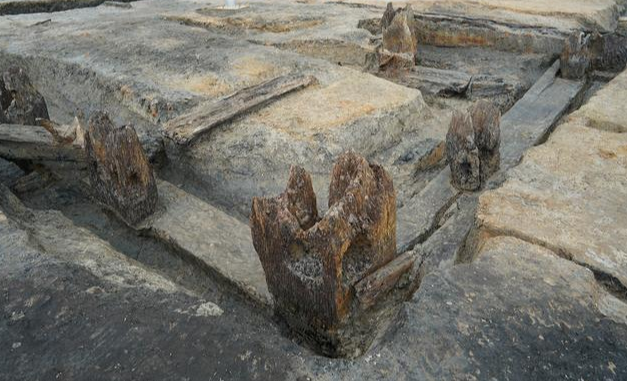
Lixian, Jijiao city site, Hunan Province
湖南澧县鸡叫城遗址
After four rounds of excavation, the remains of a large wooden structure in the western part of the site were revealed. This is the clearest structure and the most complete preservation of prehistoric wooden structure found in China, dating back to about 4,700 years ago.
经过四轮发掘,在鸡叫城遗址西侧发现了大型木结构建筑遗址。这是目前中国考古发现的保存最完整、结构最清楚的木结构建筑基础,可追溯至距今4700年前。
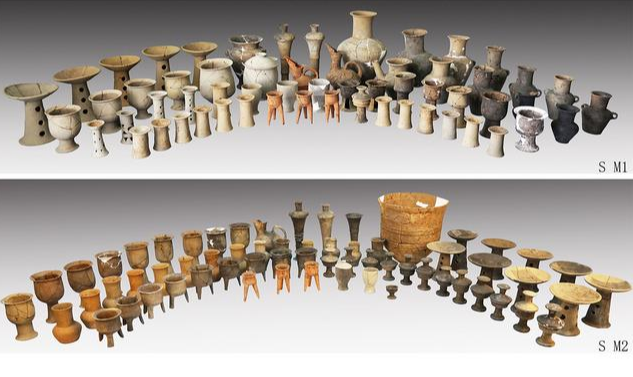
Gangshang site, Shandong Province
山东滕州岗上遗址
The Gangshang site, located in eastern Tengzhou City, east China's Shandong Province, is the earliest and largest historical site of Dawenkou culture discovered so far.
岗上遗址位于山东省东部的滕州市东岸,是迄今发现年代最早、规模最大的大汶口时期文化遗址。

Sanxingdui site, Sichuan Province
四川广汉三星堆遗址祭祀区
The Sanxingdui Ruins site is considered one of the most important archaeological discoveries of the 20th century. The excavation has lasted nearly 100 years since the first discovery in the late 1920s.
三星堆遗址被认为是20世纪最重要的考古发现之一。自20世纪20年代末第一次被发现以来,对该遗址的发掘工作已经持续了近100年。
Since March 2021, Chinese archaeologists have uncovered major finds at the site's six newly found sacrificial pits. More than 500 artifacts, such as ivory, bronze, gold and jade items, dating back about 3,000 years to the Shang Dynasty (1600-1046 BC) were discovered.
自2021年3月以来,中国考古学家对新发现的六个“祭祀坑”进行考古发掘。目前已出土金面具、青铜人像、大量象牙、玉器等500余件重要文物。这些文物历史久远,可追溯至3000多年前的商朝(公元前1600年至公元前1046年)。
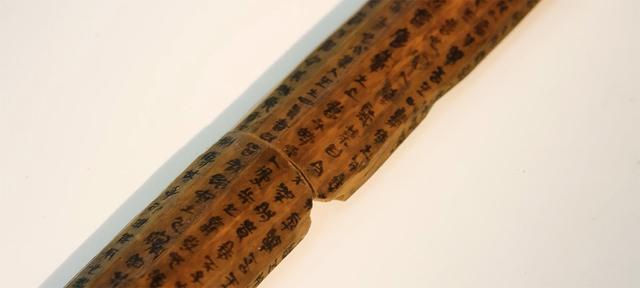
Zhengjiahu Cemetery, Hubei Province
湖北云梦郑家湖墓地
A wooden script with 700 characters was unearthed from Zhengjiahu Cemetery in Hubei Province in November, providing precious materials for studying the history of that period.
2021年11月,湖北云梦郑家湖墓地出土了战国晚期木觚,全文约700字,为研究这一时期的历史提供了宝贵的资料。
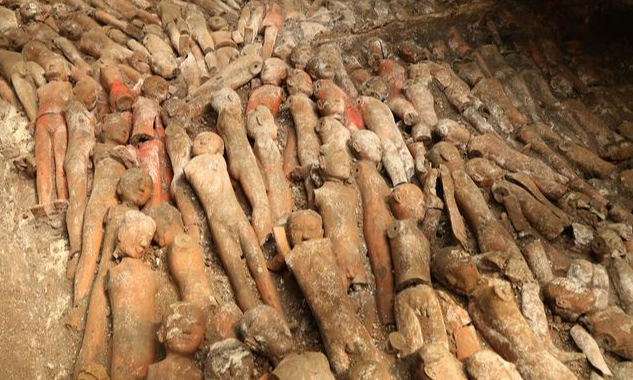
Jiang Village tomb, Shaanxi Province
陕西西安江村大墓
Jiang Village tomb is the tomb of Emperor Xiaowen of the Han Dynasty (202 BC-220 AD). In December 2021, archaeologists found a clay figure with torture tools in a pit outside the southwest corner of the tomb. It is the first time that a terracotta figure with torture tools has been unearthed in China.
江村大墓为汉文帝霸陵。2021年12月,在江村大墓西南区域的2号发掘点外藏坑,发现戴着刑具的刑徒俑。从目前现有发掘的资料来看,这是中国第一次发现刑徒俑。
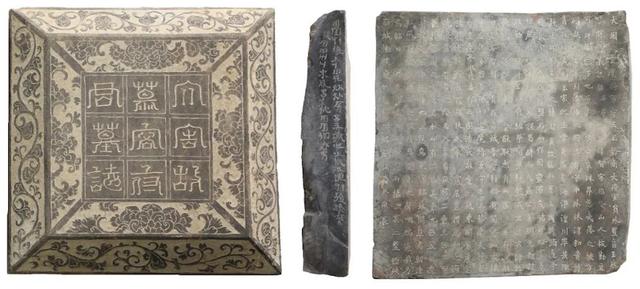
Tuyuhun Tomb, Gansu Province
甘肃武威唐代吐谷浑王族墓葬群
Tuyuhun, an ancient tomb unearthed in northwest China's Gansu Province, has been identified as a tomb belonging to a royal member of the Tuyuhun Kingdom. More than 800 pieces of objects, including textiles and pottery figurines, found in the tomb have been preserved through laboratory methods.
甘肃吐谷浑墓葬群,是一处吐谷浑王族的墓葬群。实验室考古清理保护了该墓葬纺织品、彩绘陶俑等各类随葬品800余件。
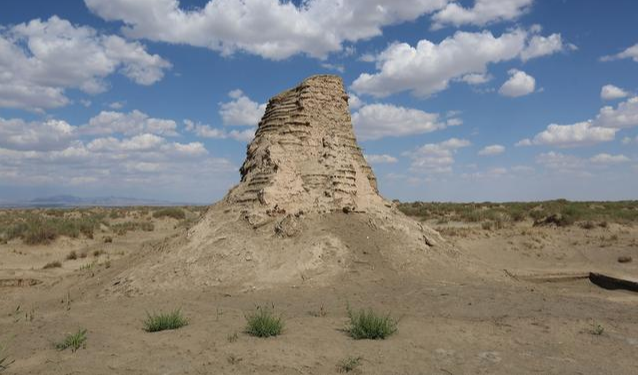
Keyak Kuduke Fengsui Site, Xinjiang Uygur Autonomous Region
新疆尉犁克亚克库都克烽燧遗址
Keyak Kuduke Fengsui site in northwest China's Xinjiang Uygur Autonomous Region is built on a large sand dune. It is a comprehensive military facility with a complete structure and function composed of residential buildings and other buildings.
克亚克库都克烽燧遗址位于新疆,修筑于一座大型沙堆上。它是由烽燧本体、居住房屋等建筑构成的一处军事设施遗址。
A large number of precious documents and wooden slips unearthed here fill in the blanks of historical documents about the defense system of military towns during the Tang Dynasty (618-907).
烽燧遗址出土的大量纸文书、木简等文书资料,填补了唐代(公元618年-907年)军镇防御体系记载空白。
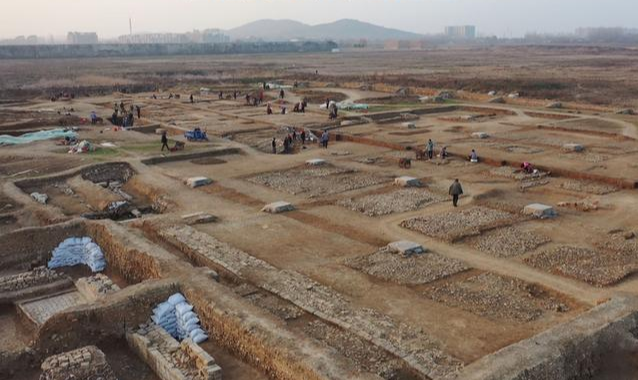
Fengyang Ming central capital site, Anhui Province
安徽凤阳明中都遗址
The Ming central capital site in Fengyang County, located in Anhui Province, is the hometown of the first Ming Emperor Zhu Yuanzhang.
明中都是明太祖朱元璋在家乡安徽凤阳兴建的都城。
The shape of the central capital of Ming Dynasty has been a mystery due to the lack of historical records. The excavation from 2015 to 2021 cleared up the layout of the main hall and affiliated buildings, resolving debates over the past 40 years and promoting understanding and research of the area.
明中都(前朝区宫殿)的形态因史料记载不详而一直成谜,2015-2021年的发掘廓清了明中都前朝主殿及附属建筑的布局,解决了40余年来的猜测和争论,极大地推进了明中都的认识和研究。
参考来源:新华社、CGTN
编辑:Kirsten













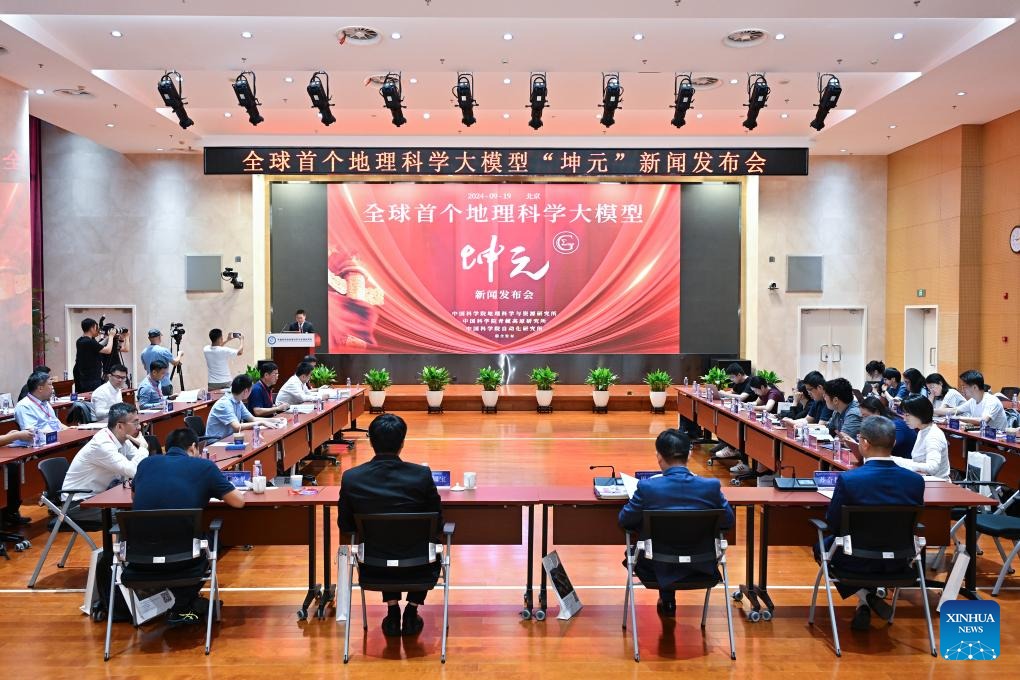



 英语点津微信
英语点津微信 双语小程序
双语小程序